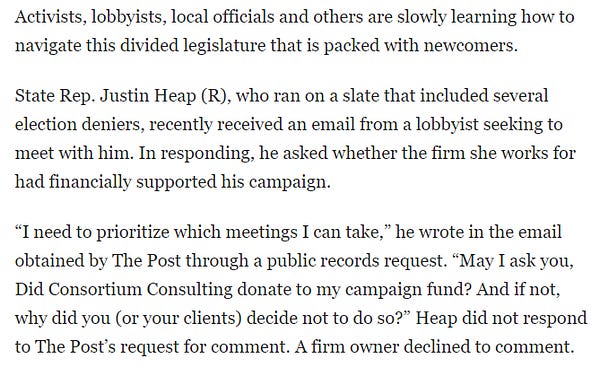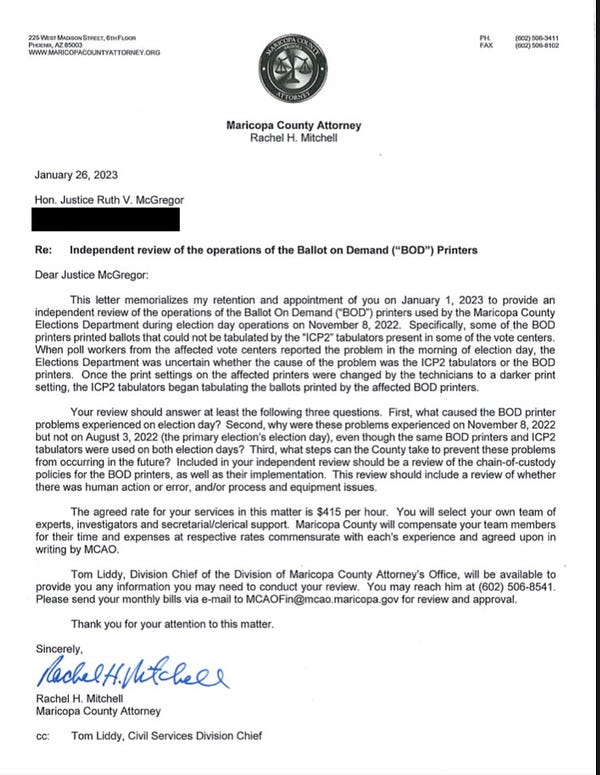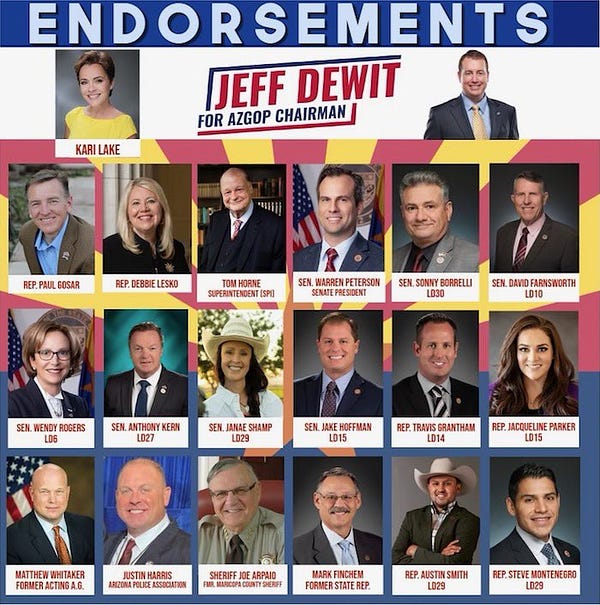The Daily Agenda: The new loyal opposition
Infighting is a symptom of power ... He said the quid pro quo part out loud ... And Wendy is Arizona's dogecoin.
Gov. Katie Hobbs took the first big loss of her governorship at Saturday’s Democratic Party statewide virtual convention when her hand-picked candidate to lead the party suffered a landslide defeat to new Democratic Party Chair Yolanda Bejarano, dealing a blow to the governor’s status de-facto leader of her party.
When Republicans met Saturday to pick their new leaders, Kari Lake and the MAGA forces finally scored an actual win as they lifted Jeff DeWit over five other candidates to a resounding victory aided in part by business-wing Republicans, making DeWit the closest thing to a consensus leader the AZGOP has seen in years.
We spent Saturday watching the Democrats’ virtual meeting on our computer from inside the GOP’s in-person meeting. As you might imagine, the differences were stark.

At the formerly magically COVID-free Dream City Church in Phoenix, outgoing AZGOP chair Kelli Ward, fresh off her own failed bid as RNC secretary, continued to spin the party’s devastating losses under her four-year tenure as victories. Ward introduced Lake as the “legitimate governor of Arizona.” She celebrated “rubbing people the wrong way.” She promised she didn’t have an extra tabulator hooked up in the back after the debacle surrounding her potentially rigged 2021 re-election victory and controversy over using machine tabulators this year. She called security to put protesters in her ranks in a “time out.” It was the usual chaos.
Democrats took a victory lap over their massive gains in recent years as the candidates went through their presentations in a quick Zoom call. They voted online. It was a pretty dull affair.
Yet Republicans may be the real winners of the day.
After losing three U.S. Senate races back-to-back-to-back and nearly every statewide office, the Arizona Republican Party had nowhere to go but up. DeWit had beefed with former Gov. Doug Ducey before it was cool, earned the Trump endorsement and secured support from the state’s most out-of-touch-with-reality Republicans. But he’s not quite one of them. DeWit has the kind of financial acumen the party has been desperately lacking and, unlike Ward, has actually won a statewide race himself.
When he entered the race and bigfooted Ward’s hand-selected replacement, Pam Kirby, out of the running, it became clear he was the MAGA favorite. His biggest threat came from the splinter faction of the GOP, the Patriot Party, and its candidate Steve Daniels, who ultimately picked up less than 10% of the vote. But business-wing Republicans, sensing he was their best option among the hardline MAGA prospects, quietly backed DeWit. Some even offered their endorsements, though DeWit didn’t promote them ahead of the vote.
“I’m optimistic for the first time in a long time,” one moderate state committeeman told us after the meeting.
Democrats, on the other hand, had nothing to gain from the infighting between the state’s top leaders over their proxy candidates for party chair. The two Arizona Democratic Party chair candidates, Bejarano and Steve Gallardo, hardly differed: Both promised to draft more Democratic candidates and win the majority at the state Capitol.
The stakes were low and the fight was unnecessary. By standing nearly alone in backing Gallardo and losing in a landslide, Hobbs weakened her political position at the very beginning of her governorship. Hobbs is not taking the loss well. In a tweet, she failed to congratulate Berajano (while also taking a shot at U.S. Sen. Kyrsten Sinema), and we hear she hadn’t returned a call from the new party chair as of Sunday.
Democrats are getting their first taste of power in Arizona in decades, and the fact that they can’t get on the same page about something as simple as a party chair candidate is not a great sign.
Republicans, recently relieved of the duty of governing, used Saturday’s reorganizational meeting to take the first steps to rebuild the party.
For decades, Democrats have been the loyal opposition, held together in their desire to stop Republicans. But staying united while governing is much harder.
Lawyers make the worst clients: In a story ostensibly about Arizona Republicans’ refusal to accept election outcomes, the Washington Post’s Yvonne Wingett Sanchez slipped in a juicy little nugget about freshman Arizona Republican Rep. Justin Heap asking lobbyists whether they had contributed to his campaign before agreeing to take a meeting with them. Several Republican lawmakers were aghast at the revelation, telling us they wouldn’t be surprised if the attorney general took note. Heap, a lawyer, put the question in writing in an email dug up from a records request and later claimed he meets with lobbyists even if they don’t contribute to his campaigns so “where’s the quid pro quo?”


Solidifying what you knew along: Records finally released by former top Cyber Ninja Doug Logan show that Trump influenced the ballot review, despite public statements to the contrary, the Republic’s Ryan Randazzo and Robert Anglen report. Now only did the former president influence the audit and its leaders, but his Save America PAC indirectly contributed $1 million to the effort, according to campaign finance analysis done by watchdog group Documented, the Guardian reports. In another Republic story, Randazzo reports on more of Logan’s records, which show the people behind the audit didn’t know election laws, were regularly in-fighting and suffered from money woes.
“It’s on my list to read through the Arizona election laws,” Logan wrote in one text. “I guess I should move that up on the list.”
Major loss for transparency: Republicans in both the House and Senate approved new rules for themselves last week, allowing them to delete public records more quickly and limiting debate. Under the new rules, lawmakers can delete emails after 90 days and text messages whenever they want, limiting public access to the inner workings of lawmaking, the Republic’s Ray Stern reports. House Speaker Ben Toma said the rule changes were needed because the only ones were “outdated,” but the changes also come after major public records battles between the Legislature and the public after the audit.
The feuding is all public now: Toma and Senate President Warren Petersen filed an amicus brief in failed AG candidate Abe Hamadeh’s lawsuit to contest the results of his loss, AZ Law reports. The legislative leaders, whose legal filing was paid for by taxpayers, argue that Hamadeh shouldn’t have to pay any sanctions related to the case and that he should get a new trial. Separately, Toma and Petersen called on Hobbs to donate the leftover funds from her inauguration fundraising to the state’s protocol fund, used to promote the state, so it can’t be used on future elections.


Seems bad: Arizona’s worsening water crisis continues to make headlines across the country. The Los Angeles Times details how the West relies too heavily on the Colorado River, which can’t sustain the growth and heavy use from the states that need it. The federal government is ready to make more significant cuts to states’ allotments if the states can’t agree on voluntary measures by the end of the month, the New York Times reports. In the New Yorker, Rachel Monroe writes about the role tribes play in Colorado River negotiations, including how the Gila River Indian Community has fought for rights to its water. Locally, the Republic has stories about how grant-supported research could help farmers adjust to less water and how Scottsdale cut its water usage (including by cutting off Rio Verde Foothills homes).
Historically ready to veto: Gov. Katie Hobbs sat down with the Republic’s Stacey Barchenger to talk about her legislative priorities and tense relationships with Republicans. The veto stamp she will use, which was once former Gov. Janet Napolitano’s, is ready to go, with “ink is fresh as anything.”
Super extremely uncool: Cochise County Attorney Brian McIntyre was arrested for “super extreme DUI,” KVOA reports. McIntyre, who refused to defend the county’s attempt to not certify the 2022 election, said nobody is above the law, “including me.”
The opposite of neighborly: A gay couple in Queen Creek say they’ve faced repeated harassment since they put up a pride flag, including neighbors yelling homophobic slurs at them, the flag being destroyed more than once and having a copy of the New Testament thrown at them, LOOKOUT reports.
Sheriffs making taxpayers go broke: The racial profiling lawsuit against Maricopa County that began under former Sheriff Joe Arpaio has cost county taxpayers at least $215 million, the Republic’s Sasha Hupka reports. The Maricopa County Sheriff’s Office, now under Democratic Sheriff Paul Penzone, is still not in compliance with the lawsuit’s provisions, so the county continues to rack up costs.
Bill roundup: There are tons of bills, most of which don’t get news coverage, but here are some recent ones that snagged a headline.
GOP Sen. Anthony Kern’s bill to increase criminal penalties for fentanyl dealers passed a committee.
A Senate resolution from Republican Sen. John Kavanagh seeks to increase penalties in hopes of deterring crime but would likely lead to more people in jail.
Republican Rep. Quang Nguyen’s bill to make sex offenses a more serious felony could implicate teenagers.
Freshman Republican Rep. John Gillette has a bill that would require schools to publicly post online their educational materials and lesson plans.
Cleaning up for the gems?: With Tucson’s premier tourism event, the Gem and Mineral Show, just around the corner, advocacy groups sued the city to prevent any sweeps of areas where people sleep outside, like in parks or washes, the Tucson Sentinel’s Paul Ingram reports. While the groups claim the city would ramp up these sweeps to try to hide homelessness for the event, the city claims there are no such plans.
A classic Zoom oops: Pima County Supervisor Matt Heinz, whose video during a public meeting where a man behind him removed his shirt made the internet rounds, explained that he was on a cruise while joining the January meeting. While he said these kinds of videos deserve a good laugh, he was “surprised by and definitely regret the homophobia this seems to have elicited,” the Green Valley News’ Mary Glen Hatcher reports.
Elections director for hire: Cochise County Elections Director Lisa Marra explained more about her resignation to her local paper, the Herald/Review. The resignation letter, sent by her attorneys, is what’s known as a “constructive discharge” notice, which gives the county 15 days to rectify the issues creating a hostile workplace or allow the resignation to proceed, the Herald/Review’s Shar Porier writes. The notice gives employees the ability to bring a legal claim later.
"My professional talents are needed in the field of elections,” Marra told the paper. “I hope and believe that expertise will certainly be valued somewhere. It saddens me that for the last couple of years, my experience has not been valued. I have devoted 10 years of my career here, always making it a priority to improve the services of government to our residents.”
Keep reading with a 7-day free trial
Subscribe to Arizona Agenda to keep reading this post and get 7 days of free access to the full post archives.








